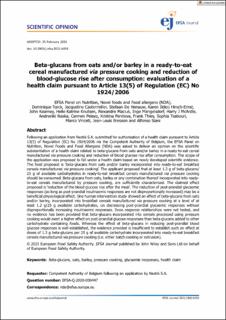| dc.contributor.author | Turck, Dominique | |
| dc.contributor.author | Castenmiller, Jacqueline | |
| dc.contributor.author | De Henauw, Stefaan | |
| dc.contributor.author | Hirsch-Ernst, Karen Ildico | |
| dc.contributor.author | Kearney, John | |
| dc.contributor.author | Knutsen, Helle Katrine | |
| dc.contributor.author | Maciuk, Alexandre | |
| dc.contributor.author | Mangelsdorf, Inge | |
| dc.contributor.author | McArdle, Harry J. | |
| dc.contributor.author | Naska, Androniki | |
| dc.contributor.author | Pelaez, Carmen | |
| dc.contributor.author | Pentieva, Kristina | |
| dc.contributor.author | Thies, Frank | |
| dc.contributor.author | Tsabouri, Sophia | |
| dc.contributor.author | Vincenti, Marco | |
| dc.contributor.author | Bresson, Jean-Louis | |
| dc.contributor.author | Siani, Alfonso | |
| dc.date.accessioned | 2022-08-01T07:51:07Z | |
| dc.date.available | 2022-08-01T07:51:07Z | |
| dc.date.created | 2021-10-28T10:49:59Z | |
| dc.date.issued | 2021 | |
| dc.identifier.citation | EFSA Journal. 2021, 19 (4), . | |
| dc.identifier.issn | 1831-4732 | |
| dc.identifier.uri | https://hdl.handle.net/11250/3009444 | |
| dc.description.abstract | Following an application from Nestle S.A. submitted for authorisation of a health claim pursuant to Article13(5) of Regulation (EC) No 1924/2006viathe Competent Authority of Belgium, the EFSA Panel onNutrition, Novel Foods and Food Allergens (NDA) was asked to deliver an opinion on the scientificsubstantiation of a health claim related to beta-glucans from oats and/or barley in a ready-to-eat cerealmanufacturedviapressure cooking and reduction of blood glucose rise after consumption. The scope ofthe application was proposed to fall under a health claim based on newly developed scientific evidence.The food proposed is‘beta-glucans from oats and/or barley incorporated into ready-to-eat breakfastcereals manufacturedviapressure cooking’. The applicant proposed that at least 1.3 g of beta-glucans/25 g of available carbohydrates in ready-to-eat breakfast cereals manufacturedviapressure cookingshould be consumed. Beta-glucans from oats, barley or any combination thereof incorporated into ready-to-eat cereals manufactured by pressure cooking, are sufficiently characterised. The claimed effectproposed is‘reduction of the blood glucose rise after the meal’. The reduction of post-prandial glycaemicresponses (as long as post-prandial insulinaemic responses are not disproportionally increased) may be abeneficial physiological effect. One human intervention study showed an effect of beta-glucans from oatsand/or barley, incorporated into breakfast cereals manufacturedviapressure cooking at a level of atleast 1.2 g/25 g available carbohydrates, on decreasing post-prandial glycaemic responses withoutdisproportionally increasing insulinaemic responses. Dose–response relationships were not tested, andno evidence has been provided that beta-glucans incorporated into cereals processed using pressurecooking would exert a higher effect on post-prandial glucose responses than beta-glucans added to othercarbohydrate containing foods. Whereas the effect of beta-glucans in reducing post-prandial bloodglucose responses is well established, the evidence provided is insufficient to establish such an effect atdoses of 1.3 g beta-glucans per 25 g of available carbohydrate incorporated into ready-to-eat breakfastcereals manufactured via pressure cooking (i.e. either batch cooking or extrusion). | |
| dc.language.iso | eng | |
| dc.title | Beta-glucans from oats and/or barley in a ready-to-eat cereal manufactured via pressure cooking and reduction of blood-glucose rise after consumption: evaluation of a health claim pursuant to Article 13(5) of Regulation (EC) No 1924/2006 | |
| dc.type | Peer reviewed | |
| dc.type | Journal article | |
| dc.description.version | publishedVersion | |
| dc.source.pagenumber | 11 | |
| dc.source.volume | 19 | |
| dc.source.journal | EFSA Journal | |
| dc.source.issue | 4 | |
| dc.identifier.doi | 10.2903/j.efsa.2021.6493 | |
| dc.identifier.cristin | 1949181 | |
| cristin.ispublished | true | |
| cristin.fulltext | original | |
| cristin.qualitycode | 1 | |
